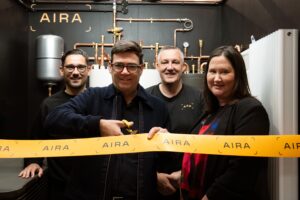Q&A with Nik Spencer, developer of the Home Energy Recovery Unit
 Nik Spencer is the founder, developer and CEO of the Home Energy Recovery Unit (HERU). As well as spearheading the UK’s first commercial recycling company, he has sat on the board of some of Britain’s biggest businesses including Kier PLC Environmental Services Board.
Nik Spencer is the founder, developer and CEO of the Home Energy Recovery Unit (HERU). As well as spearheading the UK’s first commercial recycling company, he has sat on the board of some of Britain’s biggest businesses including Kier PLC Environmental Services Board.
From animal bedding and agricultural contracting, to window cleaning, car washing, municipal waste processing and even equine livery, Nik has established and sold numerous successful businesses.
The HERU is his latest venture, driven by an ongoing goal of finding the solution to domestic waste management. Developed in partnership with leading academics from Brunel University, it is designed to alleviate the need for large-scale, expensive and inefficient waste infrastructure.
What is the HERU?
A world-first solution to domestic waste management, the Home Energy Recovery Unit (HERU) uses low-temperature pyrolysis to convert municipal waste into fuel that can be used to heat water for domestic use.
How does it work? What are the implications?
Using low temperature pyrolysis, waste is transformed into char (solid fuel), oil, water and synthesised gas, which is cleaned prior to efficiently venting to the atmosphere.
The self-contained unit is the size of a wheelie bin. Connected to the water main and drainage, HERU runs off a normal 13-amp domestic plug. The system is incredibly energy efficient, with every 1kWh of electricity consumed to power the unit generating 2.5kWh of heat energy.
In simple terms, the HERU turns waste into a resource. If adopted widely, the implications of the HERU are profound. It could end waste to landfill and wipe out fuel poverty.
What interventions you would like to see from government (or changes to current policy) to help accelerate innovation in both waste and renewable energy?
Existing legislation for domestic properties fits well with the HERU. Renewable energy generation is promoted, with incentives available to make investing in new technology possible.
However, it is obvious that sustainability has once again slipped down the government agenda (take subsidy degressions, for example). In result, we are a long way from meeting 2020 targets – we need a solution, and fast.
The government needs to understand what resources it already has and implement ways to effectively utilise it. The energy from waste (EFW) sector is a great example of this and one which we must learn from. It also needs to put in place better mechanisms to ensure that innovation and innovators find a way to bring their ideas to market.
Could HERU be applied by local authorities that own housing stock and housing associations?
The HERU would suit social housing estates perfectly. Imagine the scenario – if every property in a street is using waste to generate energy, there would be no need for the bin lorry to visit. If you amplify this scope up to an entire housing estate, local authorities would benefit from considerable savings.
In addition, it can reduce fuel costs for residents, especially important in the age of fuel poverty.
In terms of an investment equivalent, purchasing a HERU unit would come at a similar cost as upgrading to double glazing. Taking into consideration the ongoing benefit of zero waste to landfill and the HERU comes into its own as a financially-viable, sustainable technology.
Already, three local authorities have signed up to trial the HERU. Although dates are yet to be confirmed, we expect this will take place in early 2018.
Does it have applications for commercial properties too?
Currently, legislation for domestic and commercial properties is misaligned, meaning that although the HERU can theoretically be scaled-up to suit commercial use, regulatory pressures have, at present, dissuaded the necessary R&D.
Are there any statistics showing HERU’s effectiveness?
In winter, the HERU can turn a single black bin bag of rubbish into 72 litres/day of hot water at 41°C (enough for a long shower). In summer, this figure increases to 122 litres/day (enough for two showers or a bath).















